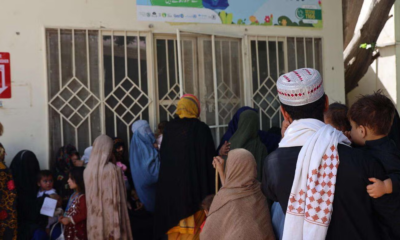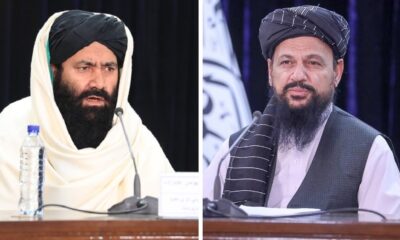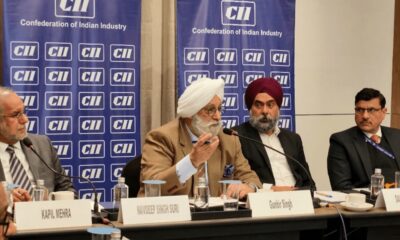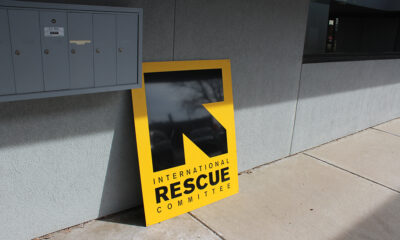Latest News
Taliban still has ties with Al-Qaeda affiliate: Pentagon

Pentagon says in a new report that Al-Qaeda-linked regional groups have close ties to the Taliban and have sustained interests in attacking the US forces and other countries.
While the Taliban has pledged to no longer allow Al-Qaeda to operate from Afghan soil, Pentagon says that the group colluding with al-Qaeda’s branch in the Indian subcontinent.
A report by the US Department of Defense to Congress on the security situation in Afghanistan shows that al-Qaeda’s branch in the Indian subcontinent regularly cooperates with bottom level members of the Taliban to weaken the Afghan government.
“We believe the Taliban still have ties to a network like Haqqani and dozens of other networks operating in Afghanistan. What the Pentagon findings are, our security agencies have the same report,” said Sediq Sediqqi, a spokesman for the Afghan president.
The Pentagon has also reported that Russia is actively working with the Taliban and other groups in Afghanistan to speed up the withdrawal of US troops from Afghanistan, as the US Secretary of State has spoken to his Russian counterpart about the matter.
“They have an objective there too. To reduce the risk of terrorism there. So yes, maybe not every time. But with great frequency, when I speak to my Russian counterparts, we talk about Afghanistan. We talk about the fact that we don’t want them engage in this,” said Secretary of State Mike Pompeo.
The Pentagon says that despite recent progress in the peace process, al-Qaeda’s branch in the Indian subcontinent maintains close ties with the Taliban in Afghanistan, possibly for protection and training.
“The enemy of al-Qaeda is the United States, and it is very clear that the relationship with the Taliban will not be cut, and that it will continue to lead to war,” said Zahir Azimi, a retired militant.
Politician Rahmatullah Bizhanpour said: “The United States wants to repeat the game in Afghanistan or start a new round of games, as the US is taking different stances against the Taliban and then directly another force called ISIS will appear in the region.”
The report regarding Iran said that Iran pursues its goals in Afghanistan by providing calculated support to the Taliban and by engaging in efforts to strengthen relations with the Afghan government.
The Taliban, however, in a statement rejected the report, calling it “propaganda and unsubstantiated.”
Latest News
Fear of deportation turns deadly for Afghan refugees in Pakistan
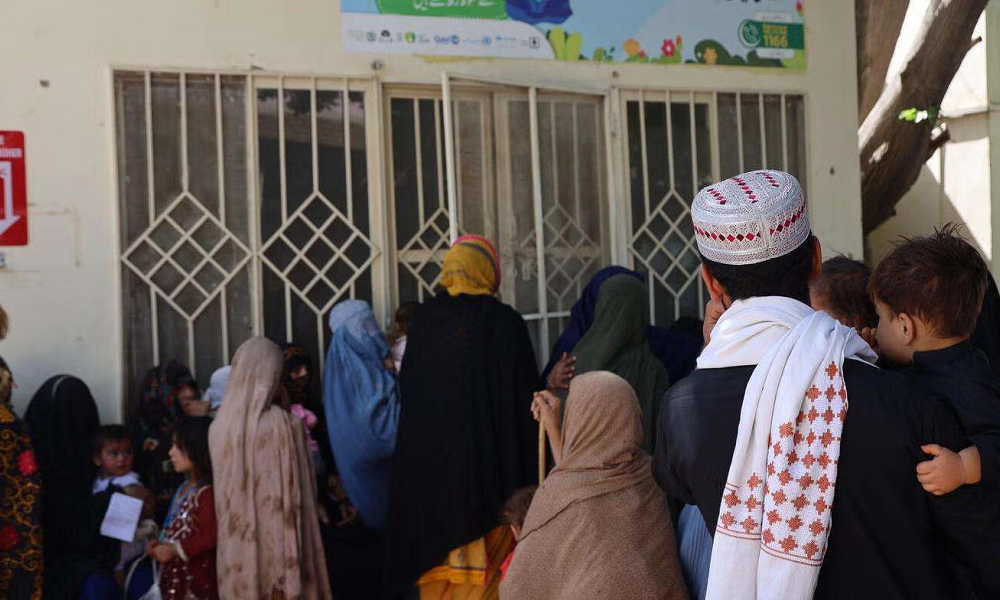
Fear of arrest and forced deportation is pushing Afghan refugees in Pakistan into life-threatening situations, with women, children and the sick paying the heaviest price, humanitarian groups warn.
Doctors Without Borders (Médecins Sans Frontières – MSF) has shared harrowing accounts of Afghan families too afraid to leave their homes, even for urgent medical care, due to Pakistan’s ongoing deportation drive.
In one recent incident, an Afghan refugee couple knocked on the door of a Pakistani rickshaw driver late on a cold November night, begging for help. The woman was in labor, but the family feared that leaving their home would result in police detention. Despite having no money, the driver agreed to take her to hospital.
“She was screaming all the way,” the driver later told MSF staff in Balochistan province. “She gave birth in my rickshaw. It was full of blood. I cannot describe it in words. It broke me mentally.”
The mother and newborn survived after receiving care at an MSF facility, but aid workers say such cases are becoming increasingly common as Afghan refugees face serious barriers to accessing health services.
According to MSF, mass deportations have turned into a catastrophic humanitarian crisis. Thousands of Afghan refugees are being held in temporary camps with little or no access to shelter, clean water, sanitation, food, or health care. With winter temperatures dropping sharply, fear of arrest is preventing many from seeking treatment, leading to miscarriages, untreated illnesses and preventable deaths.
Pakistan has hosted millions of Afghan refugees since the late 1970s. However, since November 2023, the government has implemented the Illegal Foreigners Repatriation Plan, initially targeting undocumented Afghans before expanding to Afghan Citizen Card holders and, more recently, those with UN-issued proof of registration cards.
Deportations surged again from September 2025, coinciding with winter, and are now affecting Afghans regardless of legal status.
MSF has reported tragic cases, including the death of a five-month-old baby who spent the night in freezing conditions at a holding center before reaching medical care, and the case of a woman who died after delivering a stillborn baby in a camp with no basic facilities. Her family was deported to Afghanistan shortly after—along with her body.
“Lives are at stake,” said Xu Weibing, MSF’s head of mission in Pakistan. “Afghan families are being forced to choose between living in fear of deportation and danger upon return. Safety, dignity and humanity are not optional.”
Aid organizations are urging Pakistan to halt forced returns and calling on the international community to urgently increase humanitarian assistance, provide winter shelter, health care and protection, and find safe relocation options for the most vulnerable.
Latest News
Pakistan says diplomatic channels with Afghanistan open, seeks written assurances against terrorism
The Islamic Emirate has repeatedly called Pakistan’s claims baseless and added that Afghan soil will not be used against any country.

Pakistan’s Ministry of Foreign Affairs said on Thursday diplomatic channels with Afghanistan remain active, with ongoing contacts between the two neighbouring countries.
Speaking at a weekly press briefing in Islamabad on Thursday, Foreign Ministry spokesperson Tahir Hussain Andrabi stressed that Pakistan does not interfere in Afghanistan’s internal affairs, but reiterated that terrorism emanating from Afghan soil remains Islamabad’s primary concern.
“Incidents of terrorism emanating from Afghanistan are a primary concern for Pakistan. Our demand is that Afghan territory should not be used against Pakistan,” Andrabi said.
He added that Islamabad is seeking written, verifiable, and concrete assurances from Afghan authorities to dismantle terrorist groups and prevent the use of Afghan soil for militant activities. “Without these written commitments, the issue of terrorism cannot be resolved,” he emphasized.
The spokesperson noted that addressing terrorism would open the door to a significant improvement in bilateral relations, adding that Pakistan and Afghanistan have no other major disputes.
The Islamic Emirate has repeatedly called Pakistan’s claims baseless and added that Afghan soil will not be used against any country.
Relations between Islamabad and Kabul deteriorated sharply in October 2025 following one of the deadliest military escalations in recent years. Although a ceasefire was announced on October 19, trade has yet to resume.
On Afghanistan’s regional role, Andrabi said the country has strong potential to become a regional hub, stressing that ending terrorism would benefit Afghanistan itself as well as the wider region.
Latest News
Islamic Emirate’s Supreme Leader reshuffles ministers of energy and rural development

The spokesperson of the Islamic Emirate announced on Thursday that Abdul Latif Mansour, the former Minister of Energy and Water, has been appointed as the new Minister of Rural Rehabilitation and Development.
Mohammad Younus Akhundzada, the former Minister of Rural Rehabilitation and Development, has been appointed as the new Minister of Energy and Water.
Meanwhile, Abdul Haq Hamkar, who previously served as Deputy Minister for Finance and Administration at the Ministry of Public Works, has been appointed as Director General of Da Afghanistan Breshna Sherkat, the country’s national power utility.
Mohammad Younis Rashid, the former Deputy Minister for Youth Affairs at the Ministry of Information and Culture, has been appointed as Deputy Minister for Finance and Administration at the Ministry of Public Works.
Abdul Bari Omar, the former Director General of Da Afghanistan Breshna Sherkat, has been appointed as Head of Protocol at the Ministry of Foreign Affairs.
The appointments were made by order of the Supreme Leader of the Islamic Emirate.
-

 Sport5 days ago
Sport5 days agoAfghanistan set to face West Indies in crucial T20I series
-

 Sport3 days ago
Sport3 days agoAsia’s rising stars set to shine at AFC U23 Asian Cup 2026
-

 Latest News5 days ago
Latest News5 days agoGermany repatriates 83 ‘criminal’ Afghan refugees in 2025
-

 Latest News5 days ago
Latest News5 days agoTrump criticizes abandonment of military equipment in Afghanistan after Venezuela attack
-
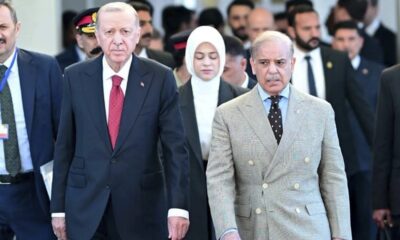
 Latest News19 hours ago
Latest News19 hours agoTurkey withdraws from Afghanistan-Pakistan mediation amid rising tensions
-

 Regional4 days ago
Regional4 days agoAs protests grow, report says Khamenei has plan to escape to Russia
-

 International Sports4 days ago
International Sports4 days agoWorld gears up for Milano Cortina 2026 Winter Olympics
-

 World5 days ago
World5 days agoWorld reacts to US strikes on Venezuela


